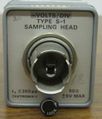GR-874 connector: Difference between revisions
No edit summary |
No edit summary |
||
| Line 18: | Line 18: | ||
The regular 50 Ω version is used in the [[1S1]], [[1S2]], | The regular 50 Ω version is used in the [[1S1]], [[1S2]], | ||
[[3S1]], [[3S7]], [[3T7]], [[4S1]], [[4S2]], [[5T1]], [[5T1A]], [[5T3]], [[7M11]], [[N]], [[S-1]], [[S-2]], [[106]], [[109]], [[110]], [[113]], [[191]], [[280]], [[281]], [[282]], [[ | [[3S1]], [[3S7]], [[3T7]], [[4S1]], [[4S2]], [[5T1]], [[5T1A]], [[5T3]], [[7M11]], [[N]], [[S-1]], [[S-2]], [[106]], [[109]], [[110]], [[113]], [[191]], [[280]], [[281]], [[282]], [[P6051]] and possibly others. | ||
By the 1970s, GR-874 connectors were being supplanted by SMA connectors in test equipment, | By the 1970s, GR-874 connectors were being supplanted by SMA connectors in test equipment, | ||
Revision as of 08:33, 24 January 2016

General Radio 874 (GR-874) connectors are hermaphroditic (asexual) coaxial RF connectors developed by General Radio in the late 1940s.
They are typically for 50 Ω impedance, but versions for 75 Ω and 125 Ω were available using the same ground shield and housing, but different center pin geometry. Different versions of the connector have different maximum voltage ratings; 1000 V is typical. There are locking and non-locking versions.
GR-874 connectors are carefully engineered to keep a constant impedance throughout the signal path, by varying connector diameters between free-air and dielectrically supported sections. These connectors therefore exhibit very little reflection and are well suited for gigahertz and pulse applications.
The Tektronix 519 uses a 125 Ω GR-874 connector which has the same ground housing as the 50 Ω variant, but has a center pin that is thinner and shaped differently.
The regular 50 Ω version is used in the 1S1, 1S2, 3S1, 3S7, 3T7, 4S1, 4S2, 5T1, 5T1A, 5T3, 7M11, N, S-1, S-2, 106, 109, 110, 113, 191, 280, 281, 282, P6051 and possibly others.
By the 1970s, GR-874 connectors were being supplanted by SMA connectors in test equipment, see e.g. the progression from the S-1 to the S-4 sampling heads.
Links
- A Radically New Coaxial Connector for the Laboratory. General Radio Experimenter, Volume XXIII No.5, October 1948
- New and Improved Coaxial Connectors. General Radio Experimenter, Volume 35 No.10, October 1961
- GR-874 Section of 1973 General Radio Catalog (PDF)
- http://en.wikipedia.org/wiki/GR_connector
- US Patent #2548457, Coaxial connector for high-frequency transmission lines. Filed 10 Jan 1947, granted 10 Apr 1951.
- 017-053 adapter









